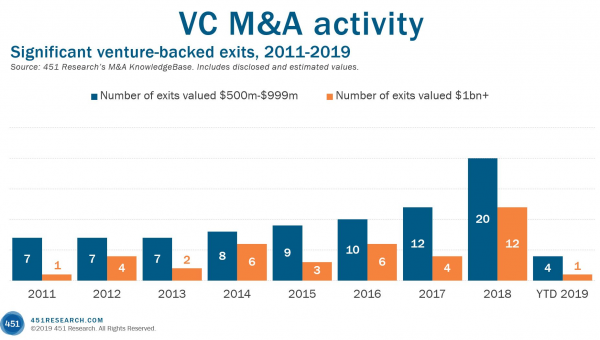by Brenon Daly
The total number of VC-backed startups hitting the exit so far this year has surged to a three-year high. But most of those deals are at the lower end of the market, according to 451 Research’s M&A KnowledgeBase. Actual unicorn sightings are extremely rare.
In fact, the M&A KnowledgeBase lists just one sale of a venture-backed company for more than $1bn so far in 2019. For comparison, last year the venture industry averaged one unicorn-sized exit every single month. The shift from last year’s ‘fewer – but bigger – deals’ for VCs to this year’s ‘more deals, but far fewer big ones’ could dry up billions of dollars of liquidity for venture firms.
Even excluding last year’s stampede of unicorns, our data shows that the previous half-decade (2013-17) averaged slightly more than four big $1bn+ exits each year for VC portfolio companies. Right now, 2019 is on track for half that number. And yet, the current number of VC-backed startups that have achieved billion-dollar valautions stands at a record high, roughly 10 times more startups than when Aileen Lee initially coined the term ‘unicorn’ in 2013.
Why haven’t venture-backed startups been realizing the same big paydays in 2019 as they have in recent years? Part of the answer is that the IPO market has been more welcoming than in years past, supplying exits this year to some of the most valuable private companies, including Uber, Lyft and Pinterest. (Don’t forget that three of the $1bn+ exits for VCs last year came when startups were snatched out of IPO registration.)
While dual-tracking may be slightly influencing the supply side of the M&A equation for venture startups, we would suggest that a significant shift in the other side (demand) is the main reason for this year’s drop-off. Simply put: The conventional buyers – the tech industry’s well-known names that tend to pay top dollar when they reach into VC portfolios – just aren’t doing deals like they once did.
To illustrate, the M&A KnowledgeBase indicates that SAP, Cisco and Microsoft all inked $1bn+ acquisitions of startups last year, paying roughly 20x in those transactions. So far in 2019, however, that big-cap trio has printed only small tuck-ins.
